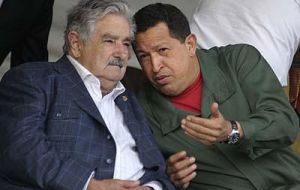MercoPress. South Atlantic News Agency
Mujica after in-depth discussion on ‘a real integration of Mercosur” with Chavez
 The two presidents have a good relation and Venezuela has become Uruguay’s main market for dairy produce
The two presidents have a good relation and Venezuela has become Uruguay’s main market for dairy produce Uruguayan president Jose Mujica has plans to meet two, probably three times before the end of the year with his peer from Venezuela, Hugo Chavez to address “a real integration” of Mercosur, not limited to trade, but at the same time admitting that Venezuela is rapidly becoming one of the main markets for Uruguayan exports.
Next week President Mujica leaves for Cadiz, Spain to attend the two-day Ibero-American summit, November 16 and 17, where a first contact with Chavez is programmed.
“One of the purposes of the trip to Spain is to meet with Chavez, but he could possibly fly back to Caracas with the Venezuelan president, when hopefully the two leaders will have more time to discuss Mercosur and integration”, said Executive sources in Montevideo.
A third meeting is expected in Brasilia in early December for the Mercosur presidential summit when Brazil will hand the rotating chair of the group to Uruguay.
In recent statements Mujica has stated that he has “the determination and interest of having a serious in-depth discussion with Chavez about Mercosur. What I plan to ask him and I also ask myself, is when the day will arrive that we have converging policies in Mercosur”.
He added that relations in the block “can’t be limited to increasing trade or squabbling about what I can sell you and what you can sell me; it’s more than time to discuss a real integration at Mercosur and continental level”.
Mujica said he does not consider Mercosur “a frozen project but rather a militant integration cause” for which “we might have to change some rules and documents, and try to release from some the free trade agreements we have or don’t have with other members and third parties”.
Mercosur this year underwent one of its worst peaks of conflict when three of the original full members (Argentina, Brazil and Uruguay) suspended fourth member Paraguay for the removal from office of Fernando Lugo following impeachment by the Senate. The removal was described by Mercosur and Unasur as a “legislative coup” given the speed of the process which ousted Lugo.
However the three members took advantage of the suspension and approved the immediate incorporation of Venezuela as the fifth full member of Mercosur, which was frozen since 2006 because the Paraguayan was point blank against the presence of President Hugo Chavez in the regional trade and political group.
The decision has a whiff of illegality since under Mercosur rules new incorporations must count with the unanimous approval of all full members, which did not happen because of the suspension of Paraguay.
Mujica a strong sponsor of having Chavez in Mercosur argued when the suspension that sometimes ‘political decisions’ are more significant than rules, and underlined the importance of Venezuela as a trading partner for Uruguay. He also recalled that Venezuela is “an empire of energy” and that the country is the main supplier of crude to Uruguay in beneficial credit terms. Besides is avid for food.
The latest foreign trade release seem to confirm Mujica words since in the ten months of 2012, Uruguayan exports to Venezuela soared 42.9% from 255 million dollars to 365 million, representing 4.9% of total overseas sales. This compares with the 3.8% of 2011 and 3.7% of 2010. In 2012 Venezuela has also climbed from position seven to five (ahead of the US and Russia) and is expected to displace Argentina in coming months.
Uruguay’s main export to Venezuela are dairy products, which also has a drawback since the oil exporting giant now concentrates over 50% of all sales of that industry.
Argentina remains in fourth place behind Brazil, the free trade zone of Nueva Palmira and China, but it has been losing ground because in 2010 and 2011 she was ranked in third place.
So far this year exports to Argentina totalled 429 million dollars, which means a 5.7% share of Uruguay’s overall trade, but traditionally Argentina has been in the range of 7.5%. In the ten months of this year exports to Argentina dropped 13.5%.




Top Comments
Disclaimer & comment rules-

-

-

Read all commentsThat man makes me so proud!! :)))
Nov 06th, 2012 - 07:13 am 0Mujica seems to be getting ready to remove Uruguay from the stranglehold of Mercosur “we might have to change some rules and documents, and try to release from some the free trade agreements we have or don’t have with other members and third parties”.
Nov 06th, 2012 - 10:21 am 0Excellent move, let Dead Man Walking Chavez go and play at Emporers elsewhere.
Chris, you must be a CIA troll. You cannot actually believe what you write. From now on that is how you will be perceived here. Nothing but a CIA troll. You will need to change you pseudonym now, but we will watch for you and call you out.
Nov 06th, 2012 - 11:09 am 0Commenting for this story is now closed.
If you have a Facebook account, become a fan and comment on our Facebook Page!